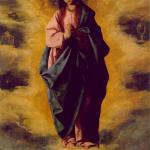Lucas Banzoli is a very active Brazilian anti-Catholic polemicist, who holds to basically a Seventh-Day Adventist theology, whereby there is no such thing as a soul that consciously exists outside of a body, and no hell (soul sleep and annihilationism). This leads him to a Christology which is deficient and heterodox in terms of Christ’s human nature after His death. He has a Master’s degree in theology, a degree and postgraduate work in history, a license in letters, and is a history teacher, author of 25 books, as well as blogmaster (but now inactive) for six blogs. He’s active on YouTube.
The words of Lucas Banzoli will be in blue. I use RSV for the Bible passages unless otherwise indicated.
This is my 20th refutation of articles written by Lucas Banzoli. As of yet, I haven’t received a single word in reply to any of them (or if Banzoli has replied to anything, anywhere, he certainly hasn’t informed me of it). Readers may decide for themselves why that is the case.
*****
I’m replying to a portion of Lucas’ article, “Maria pecou?” [Did Mary sin? ] (2-5-15).
4. Mary thought Jesus was “out of his mind”
If I ask you if it is a sin for a person to think that Jesus was crazy, you would certainly say yes. This is not just a sin, but one of the most grievous – even though this unbelief is temporary and not permanent. Let us read the following biblical text:
[Lucas’ Portugese translation, rendered into English] “When his relatives heard about it, they went out to seize him, for they said, ‘He is beside himself’” (Mark 3:21)
Mark 3:21 (RSV) And when his family heard it, they went out to seize him, for people were saying, “He is beside himself.”
Of course the Papists will take Mary out of the picture and say that only Jesus’ brothers (oops, I mean cousins!) were present on this occasion. But that is not what the biblical text says. Analyzing the context, we see that these family members were his mother and brothers, and not just his brothers:
Mark 3:31 (RSV) And his mother and his brothers came; and standing outside they sent to him and called him.
Therefore, Jesus’ mother was also part of Jesus’ relatives who were outside the house, sending for him because they thought Jesus was “out of his mind”, that is, crazy. If that’s not a sin, I don’t know what is!
Note the italicized and bolded word “people” above, in the RSV translation. This is key to understanding this incident and the two passages brought forth by Lucas. There is dispute even about who was making this claim of Jesus’ supposed craziness or mental instability: was it his relatives or the scribes?: whose opinion of Jesus was reported in the next verse:
Mark 3:22 And the scribes who came down from Jerusalem said, “He is possessed by Be-el’zebul, and by the prince of demons he casts out the demons.” (cf. Jn 10:20-21)
Context highly suggests to me that “people” (or “they”) in Mark 3:21 is indeed specifically referring to the scribes, since we know that they thought He was demon-possessed. They alone are described as having this utterly hostile view, not the masses, who, except in Nazareth, generally were in Jesus’ favor. It’s not just Catholics who think the reference was not to Jesus’ family. Bengel’s Gnomen commented:
ἔλεγον, they were saying) the messengers [not the relatives] from whom his relatives heard of His earnestness.—ὅτι ἐξέστη, He is beside Himself) By this word they were attributing to Him excess of ardour, overwhelming His intellect, but it was falsely that they attributed this to Him, as Festus did to Paul; Acts 26:24, Thou art mad.
Johann Albrecht Bengel (1687-1752), according to Wikipedia, “was a Lutheran pietist clergyman and Greek-language scholar known for his edition of the Greek New Testament and his commentaries on it.” So he understood the Greek text, and deemed that the reference to Jesus being crazy did not come from His family. This isn’t Catholic bias in favor of Mary, but the scholarly opinion of a Lutheran Greek scholar as to what the text is expressing in the first place.
In this understanding, the text is simply construed as His family coming out to remove Him from hostile enemies, who were massively misunderstanding Him, accusing, and perhaps becoming violent (as at Nazareth, when His critics tried to throw Him over a cliff). Hence, there would be no necessary implication (in this particular passage and incident) of His family’s (let alone Mary’s) disbelief in Him. They were concerned for His safety. Other English translations convey what I believe to be the true sense of the passage:
NRSV When his family heard it, they went out to restrain him, for people were saying, “He has gone out of his mind.”
Good News / (TEV) When his family heard about it, they set out to take charge of him, because people were saying, “He’s gone mad!”
Moffatt . . . . . . for men were saying, “He is out of his mind.”
Phillips . . . for people were saying, “He must be mad!”
NEB . . . for people were saying that he was out of his mind.
Easy-to-Read Version (ERV) . . . They went to get him because people said he was crazy.
Mounce Reverse Interlinear . . . for people were saying, “He is out of his mind.”
Methodist Drew S. Holland, Assistant Professor of Religion and Philosophy at the University of Tennessee, in a fascinating and thought-provoking 26-page article devoted to Mark 3:21 (“The Meaning of Ἐξέστη in Mark 3:21”: The Journal of Inductive Biblical Studies 4/1:6-31 [Winter 2017] ) concurs with my interpretation as to who was making the claim in question about Jesus. Holland (surprisingly) vigorously contends that the text doesn’t even have to do with Jesus’ alleged madness, but that’s another question altogether. My concern is to identify who made the claim in the first place. He concurs with me in that respect:
[I]t is the crowd, not οἱ παρ’ αὐτοῦ, who makes this claim about Jesus. (p. 6)
I argue here for a reading of Mark 3:21b that may be translated: “And having heard, the ones near him [the disciples or his family] went out to take hold of him; for they [the crowd] were saying . . .” (p. 9)
As with Mark 3:21, there is no condemnation of Jesus by his family in 3:31, . . . we cannot say that the connection of these two verses indicate that Jesus’s family misunderstands him. (p. 14)
We no longer need to be caught up in the debate about whether Jesus’s disciples or his family make this unflattering claim about him, because neither does. Rather, it is the crowd that does so . . . (p. 15)
Dr. Holland gives his interesting opinion as to why Jesus’ family (or friends) came to “sieze” Him (Mk 3:21):
The second pattern is that Jesus’s disciples always protect him from an adoring crowd, not an upset one. This is present in Mark 3:9 [“And he told his disciples to have a boat ready for him because of the crowd, lest they should crush him”: RSV]; 6:36; 8:4; 10:48; and 14:47. Although the identity of οἱ παρ’ αὐτοῦ in Mark 3:21 is often debated, nearly all commentators agree that it is Jesus who is seized and that either his disciples or his family is protecting him from the crowd. Where scholarship has failed in this respect is the reason for seizing Jesus. But, it would not be Markan style to indicate that they restrained him from an irate crowd and there is nothing in the context to indicate this. Rather, they restrained Jesus because the crowd adored him and wanted to come closer to this miracle worker. This sets the stage for the crowd’s positive reaction to Jesus, which the scribes soon attempt to squelch. (p. 25)
I’m not sure I agree with this. I’d have to think about it a lot more. But this does again (for my present purposes) confirm that His family didn’t think He was nuts. They were simply trying to remove Him from the dangers of a crowd: whether an adoring one (that can still be dangerous) or a small (i.e., the scribes) or larger hostile portion of the crowds.
Even in the translations that have “they were saying.” etc. (as very many do), it’s a question of who “they” refers to. It can still be read as others besides the family. The 1953 Catholic Commentary, edited by Dom Bernard Orchard, has some very good commentary on the passage:
The usual interpretation is that relatives (or followers) of Christ, disturbed by reports, came out to take charge of him. The following points are to be noted. (1) The phrase οἱ παρ’αὐτοῦ does not necessarily mean relatives (friends). It has a wider usage which would include disciples, followers, members of a household. It is not certain that the persons designated by this phrase are the same as ‘his mother and brethren’, 31. Even if they are, there is no reason for thinking that our Lady shared in the sentiments of the others, though she would naturally wish to be present when the welfare of her divine Son was in question. (2) ‘For they said’, rather, ‘For people were saying’. If this be correct, then 21b refers to reports which reached Christ’s friends, not to an expression of opinion by them.
I readily grant that it’s certainly possible that some of Jesus’ relatives — thinking with the carnal mind that virtually everyone possessed before Pentecost — may have vastly misunderstood Him. If so, nothing in that contradicts what Catholics believe. We know that there was some unbelief among His relatives, whom I believe were His cousins, based on many arguments that I have repeatedly defended (“For even his brothers did not believe in him”: John 7:5). But this doesn’t include Mary, nor can any passage be found that directly implies any disbelief in Mary about her Son and His status as God Incarnate and Messiah. She knew about that from the time of the Annunciation.
“Unbelief” in Jesus — in any event — was common before the indwelling of the Holy Spirit at Pentecost, and was frequently exhibited even by His disciples, as I commented upon at length in one paper. So this ought not surprise us in the least that some of Jesus’ relatives fell into it (including possibly in the passage under consideration). In any event, there is no hint of evidence that Mary was among these nonbelievers. It’s sheer speculation based on an unimpressive argument from silence.
It would be like saying, “the twelve disciples all believed in Jesus and never ceased doing so.” We know that one, Judas Iscariot, ultimately did not. Or, “no disciple ever doubted that Jesus was risen after hearing reports that He was.” Again, we know that Thomas did doubt (John 20), though it was short-lived. One can’t determine all particulars of beliefs of those in a group, with sweeping statements or mere speculations.
Likewise, by the same logic, one can’t determine from “When his family heard about this, they went to take charge of him, for they said, “He is out of his mind” (Mk 3:21, NIV) — even if we accept this rendering of the passage (which I don’t), and Mary is mentioned as being with them ten verses later –, that Mary was included in the opinion. There’s simply not enough information. It remains an argument from silence. We could know this for sure only as a result of a biblical passage (if there had been one) like the following: “When his mother heard about this, she went to take charge of him, for she said, ‘He is out of his mind’”.
That would be conclusive, and no one could deny its clear meaning. But that’s not what the passage (in any translation or interpretation) positively asserts, and so it remains speculation and an argument from silence: in which case anyone is equally justified in believing that she did not think that, as they are in thinking that she did. We don’t have enough information (here or anywhere in the New Testament) to decisively claim that she thought negatively about Jesus.
And that remains true about Mark 3:21 regardless of whether one thinks that Mary was sinless (as Catholics do) or not. It’s a matter of logic and exegesis. The burden of proof is on the Protestant to try to prove a “sinful Mary.” Lucas has failed to do so here, in his shoddy, epistemologically inadequate, blasphemous, and slanderous anti-Catholic thinking. Shame on him! This is bearing false witness (a grave sin), and against no less than the Blessed Virgin Mary, the Mother of God the Son.
***
Practical Matters: Perhaps some of my 4,000+ free online articles (the most comprehensive “one-stop” Catholic apologetics site) or fifty books have helped you (by God’s grace) to decide to become Catholic or to return to the Church, or better understand some doctrines and why we believe them.
Or you may believe my work is worthy to support for the purpose of apologetics and evangelism in general. If so, please seriously consider a much-needed financial contribution. I’m always in need of more funds: especially monthly support. “The laborer is worthy of his wages” (1 Tim 5:18, NKJV). 1 December 2021 was my 20th anniversary as a full-time Catholic apologist, and February 2022 marked the 25th anniversary of my blog.
PayPal donations are the easiest: just send to my email address: [email protected]. You’ll see the term “Catholic Used Book Service”, which is my old side-business. To learn about the different methods of contributing, including 100% tax deduction, etc., see my page: About Catholic Apologist Dave Armstrong / Donation Information. Thanks a million from the bottom of my heart!
***
Photo credit: The Annunciation (1644), by Philippe de Champaigne (1602-1674) [public domain / Wikimedia Commons]
***
Summary: Brazilian Protestant apologist Lucas Banzoli attacks Mary, in claiming that she thought Jesus was crazy, based on inconclusive exegesis and an argument from silence.














